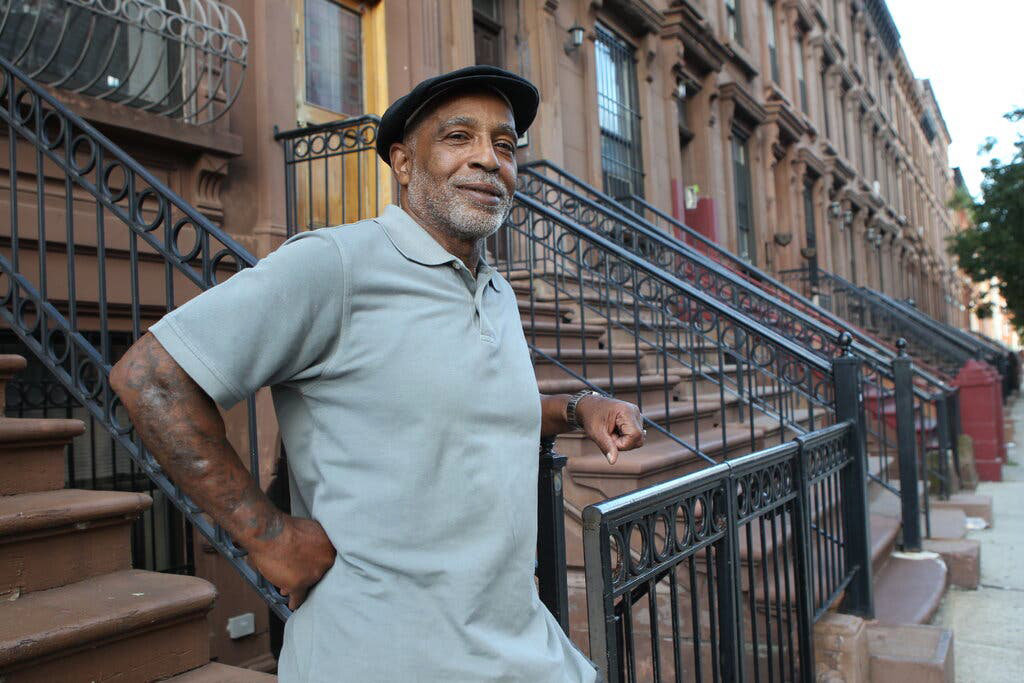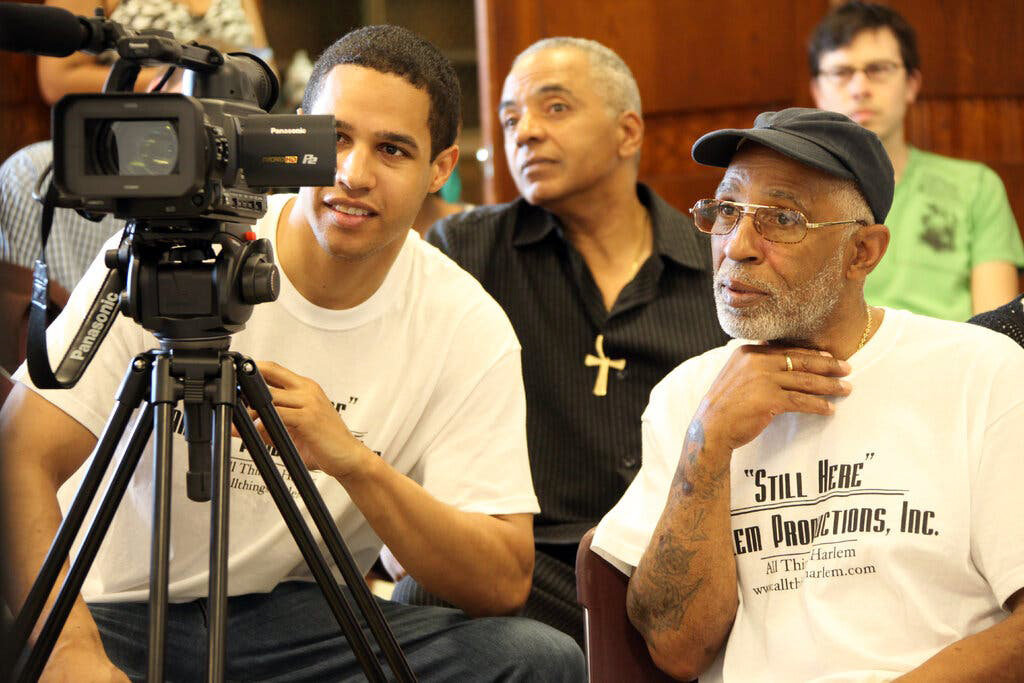A former lieutenant in a Harlem drug gang, he earned two academic degrees in prison and became an advocate for parolees and convicts.
Joseph Hayden, a former lieutenant in a notorious Harlem drug gang who had cycled in and out of prison for decades before turning his life around to become an activist for criminal justice reform and a well-known figure in Harlem, wielding a camera to document possible police harassment, died on Jan. 6 in Northampton, Pa. He was 82.
The cause was a heart attack, his daughter Jo-Anne Hayden-Williams said. Mr. Hayden was at her home at the time.
While behind bars in the 1990s, Mr. Hayden recouped the formal education he had ignored as a street hustler earlier in life, earning bachelor’s and master’s degrees.
“As I educated myself and developed, I began to see opportunity in other areas,” he told The New York Times in 2009. “I started to work on changing the system, on trying to reform the system.”
Mr. Hayden filed a class-action lawsuit in 2000 to restore voting rights to prisoners and parolees. Hayden v. Pataki, which was argued in federal court by the Legal Defense Fund, a civil rights group, ultimately failed. But it was an early salvo in a national campaign to restore ex-felons’ voting rights, which Gov. Andrew Cuomo did in New York by executive order in 2018.
Janai Nelson, the president of the Legal Defense Fund, called Mr. Hayden “a legend in Harlem and in the broader community of formerly incarcerated activists,” one who “helped to jump-start a powerful movement” to win voting rights for released felons.
Jamal Joseph, a former member of the Black Panther Party who is now a film professor at Columbia University, and who knew Mr. Mr. Hayden for much of his life, said in an interview that he had been “a young gangster on the streets” who came out of prison dedicated to political and social activism.
“He totally put the streets behind him and embraced what he could do in Harlem,” Mr. Joseph said. “It shifted the narrative about formerly incarcerated folks. Before, there wasn’t this idea that society owed them a debt, that many people had been wrongfully incarcerated or overly incarcerated.”
In 2010, Mr. Hayden was galvanized by “The New Jim Crow: Mass Incarceration in the Age of Colorblindness,” a best-selling book by Michelle Alexander whose thesis was that tough-on-crime laws that led to an exploding population of Black men in prison were an attempt to roll back the gains of the civil rights era.
Mr. Hayden created an advocacy group to end mass incarceration and invited Ms. Alexander to speak at Riverside Church in Manhattan. She expected a modest crowd but was startled to find 1,000 people, including the activist Angela Davis and the Princeton professor Cornel West, who had been drawn by Mr. Hayden’s outreach.
“I was blown away by this 70-year-old-man who had more energy, passion, and commitment than many organizers a fraction of his age,” Ms. Alexander wrote later when she nominated Mr. Hayden for a fellowship for grass-roots organizers.
Riverside Church was also the setting for a commemoration Mr. Hayden helped organize in 2011 on the 40th anniversary of the Attica prison uprising, considered a milestone in the movement for prisoners’ rights. Mr. Hayden had been an Attica inmate but was transferred days before the violence in 1971, in which 43 men died. Some 2,000 people packed the church for the memorial.
In later life, Mr. Hayden played down his criminal past. A New York police spokesman told The Times in 2012 that Mr. Hayden had nearly two dozen arrests dating to 1957. He was in Attica for the attempted murder of a police officer, a conviction that Mr. Hayden said had been reversed.
“To me, crime is a response,” he said in 2009. “You play the hand you’re dealt in life. And the hand I was dealt was very harsh.”
Joseph Hayden was born in Harlem Hospital on May 12, 1941, to Sylvia Hayden, who later worked as a hospital dietitian, and Alfred Freeman, a merchant seaman. The couple separated shortly after his birth, and Joseph was raised by his mother, though accounts of his early life suggest that he fended for himself on the streets.
In addition to Ms. Hayden-Williams, his survivors include six other children, Geneva, Jazzanee and Nicole Hayden, Jazzmin Brown, Stephen Ramon and Joseph Adams; a sister, Gloria Hayden; 12 grandchildren; and three great-grandchildren. His wife of more than 30 years, Jacqueline (Adams) Hayden, a project manager for a construction company, died in 2013.
As a youth, Mr. Hayden, who since childhood was known by the nickname Jazz, scratched for income on the streets, gambling and selling small amounts of marijuana and heroin, he told the author T.J. English for “The Savage City” (2011), a chronicle of violence in New York during the 1960s and ’70s.
Mr. Hayden was arrested for the first time at 16, on charges of heroin possession, and went to prison for three years. He emerged “bitter, angry and dangerous,” he told Mr. English. “It literally turned me into an animal.”
In the 1970s, he was a top lieutenant to Nicky Barnes, the flamboyant Harlem drug dealer known as “Mr. Untouchable.” (Mr. Barnes was portrayed by Cuba Gooding Jr. in the 2007 film “American Gangster.”)
Mr. Barnes, a folk hero in some corners of his community, formed a circle of seven associates named the Council, which included Mr. Hayden. At a trial in 1977, prosecutors called Mr. Hayden the No. 2 man and presented a tax return in which he declared $136,460 in “miscellaneous income.”
He, Mr. Barnes and others were convicted of conspiracy to distribute $1 million worth of heroin a month. Mr. Hayden received a 15-year sentence.
Released from federal prison in the 1980s, he was not free for long. He was found guilty of manslaughter in the death of a sanitation worker during a traffic argument and served 12 years.
Emerging from prison for the final time, in 2000, he began his years of activism. In 2008, he raised $40,000 and began filming community news events in Harlem, uploading them to his own site, All Things Harlem.
His most popular videos were a series called “Copwatch,” in which he recorded police officers patting down Black and Latino people and sometimes making arrests. It was the height of New York’s stop-and-frisk policing policy, which opponents criticized as racial profiling and harassment.
Mr. Hayden did not hesitate to add his own commentary to the videos. “This is the kind of policing we get in Harlem,” he said derisively in one, between expletives, as police were shown arresting a man found with a marijuana cigarette.
In 2011, Mr. Hayden himself was pulled over for driving with a broken taillight. The police noticed a souvenir baseball bat from a Yankees game in the back seat and a switchblade knife in the front console. They charged him with weapons possession. He called it a “bogus stop and frisk” that was retaliation for his documenting of police activity.
In court nearly a year later, the Manhattan district attorney’s office rejected claims that the traffic stop was payback, but prosecutors dropped one charge and offered to dismiss a second if Mr. Hayden performed five days of community service. He called it “a complete and total victory.”
